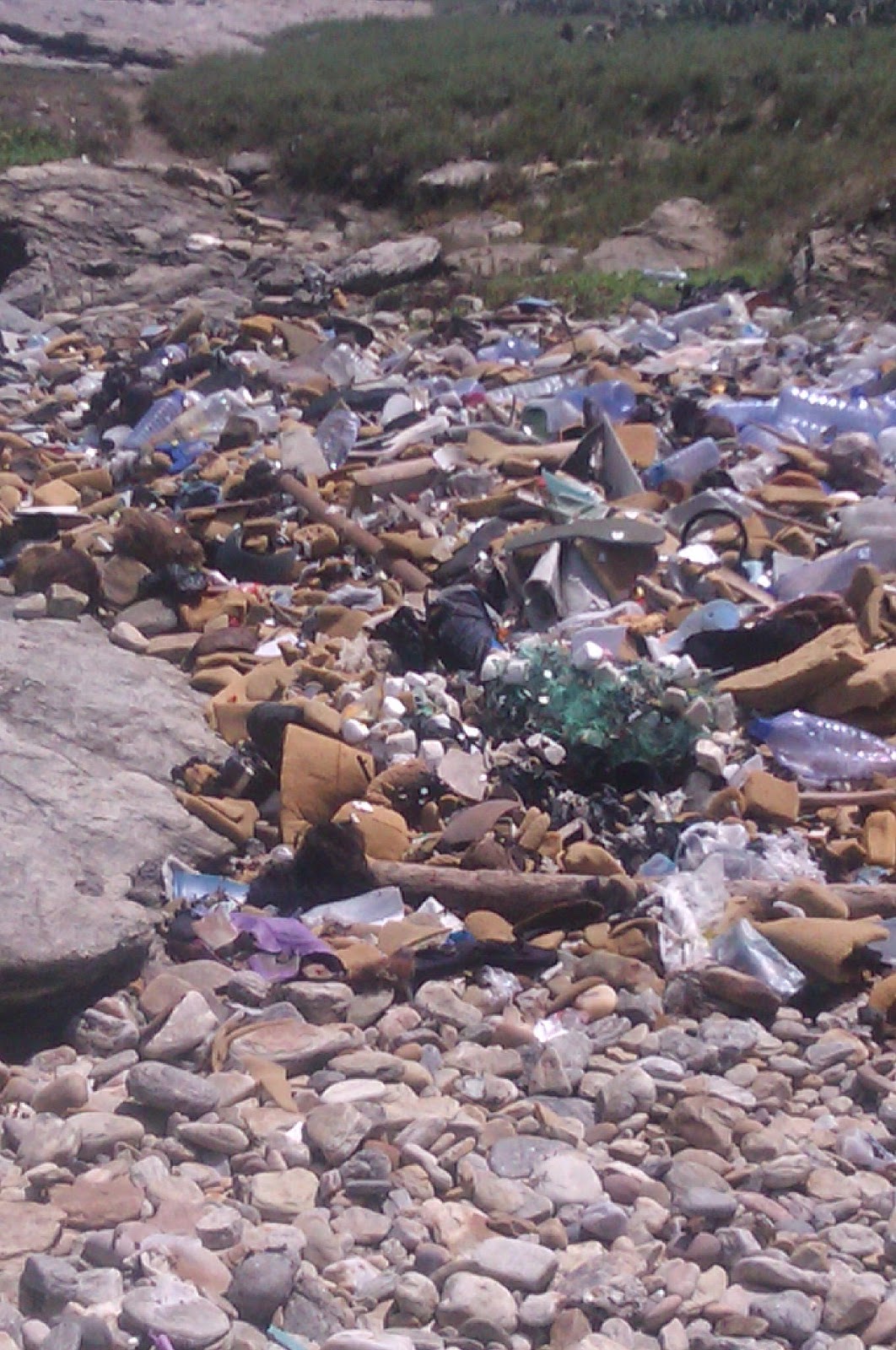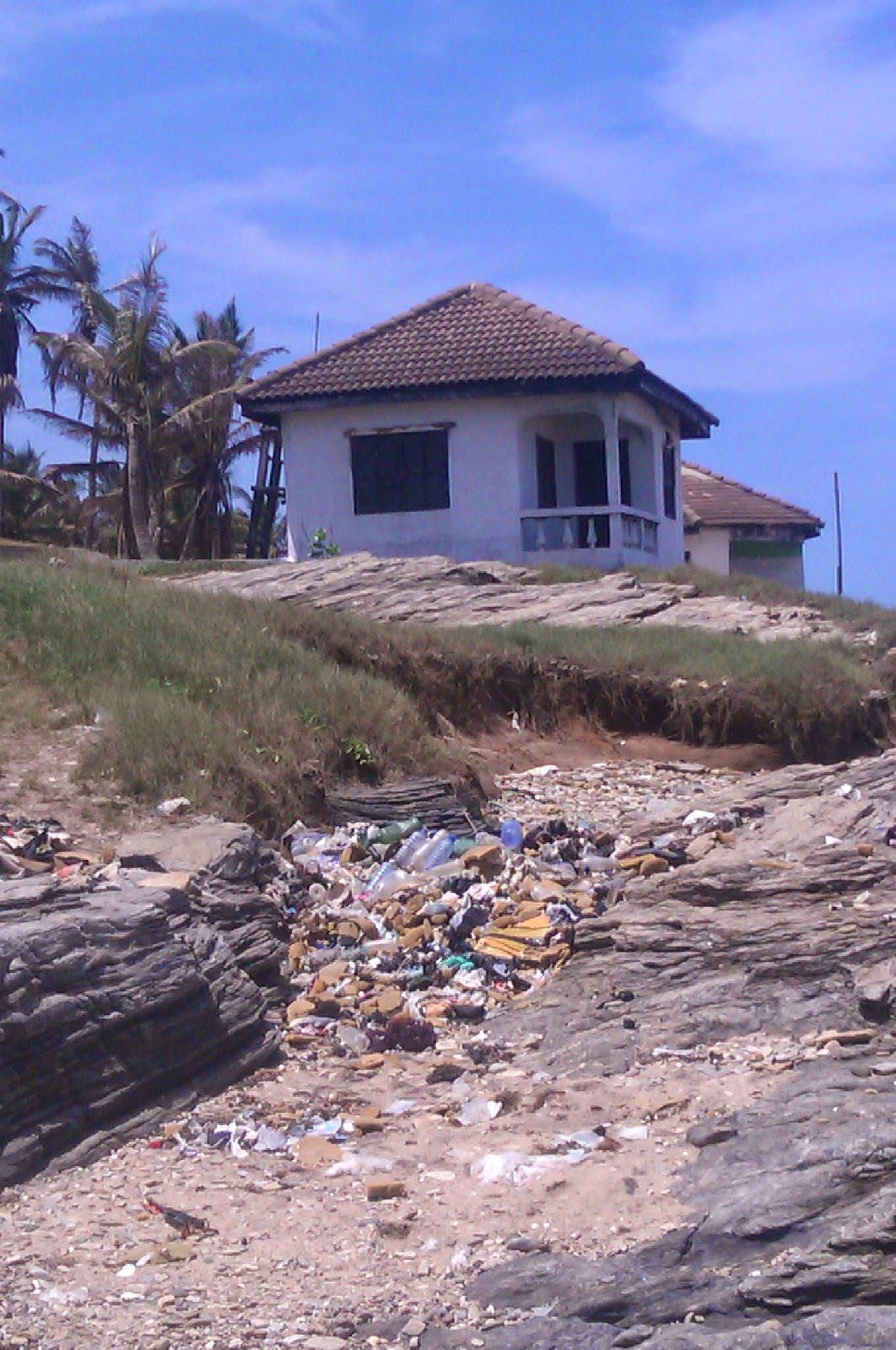The Impact of Plastic Pollution Accra Next Door Resort. (Health, Safety and Well-being)
From the authorities a simple step, would be to ban the use of the black bags as career bags and have a degradable material such as a paper form used as brown paper career bags. A sense of responsibility and public awareness has to be created to help encourage recycling increasing the current efforts after all even presently there is an economic market value for recycling these plastic bottles and sachet bags.
Next Door on the Labadi, Teshie road was one of the places to be in the (90s) and early (2000s) it gave the residents of Accra a nice place to hang out with friends and family for drinks or to dine. The rocks gives this sense of adventure when you walk on them, coursing your way through like a great explorer, the jumps and skips and the rate at which the waves come in, to hit the rocks all adds to the joy one gets when one visits Next Door. The little ponds of water between the rocks that forms for the small fishes to seek refuge all adds to the sense of paradise. It is less hectic than the Labadi beach and it is all because the shoreline is made of rocks and not sea sand.
Next Door and the rocks are lover's choice, not a weekend passes by without one noticing a couple sitting or walking on the rocks hand in hand. Nature is beautiful for even sitting on the rocks enjoying the sea breeze is priceless and such joy of memory to have. As a prime location Next Door serves the tourism industry and it is favored by the expatriate community and the local residence.
Unfortunately due to the attitude of the population in Accra when it comes to waste and the city's inactive management of plastic pollution and other waste such as baby pampers, all these pollution products end up in the gutters and on the streets all around the city. The rain is our only saving grace, that washes away all the plastics polluted waste from our streets and gutters, though no sooner has the rain finished washing the plastic waste, do we again start damping our waste on the streets. A look into any of the big gutters or drains in the city when it is raining and you are met with layers and layers of plastic bottles and empty sachet water bags as well as the small black rubber bags that are used as service bags when we buy products from the vendors being washed to sea. One gets the bag, some times even two, a clear white and a black bag, from buying items such as ice cream, to coconut, roasted plantain, waakye, kenkey literally almost every product one buys you are likely to be given a black bag to carry along.
Due to the culture as stated earlier and the lack of bins around, from kids to adults it is common to witness someone drink a sachet water and just drop the plastic on the floor right where they stand. We all get to live in a city where our gutters are chocked up because of the plastics pollution and this leads to floods every time it rains in Accra.
For the plastic waste that makes it out to sea, they become death traps for the fishes, where some consume the plastics thinking they are food and others being wrapped around by the plastics and ending up drowning. Though majority of the plastic waste that goes out to sea, with the rain water comes back to shore. It has become common to see each sea wave all cross the beaches of Accra with black plastic bags in them, wave upon wave, like the ghost haunt by the sea, throwing out our skeletons in the closet, the beach landings have all got plastic waste pollution on them.
In Next Door, the situation is even worse, this is due to the rocks there, when the high tide comes in, it washes all the plastics especially bottles and the sachet into the rocks and leaves them behind since the rocks acts like a sieve holding back all that is not liquid, this is where the sea spits with disgust the horrible taste we put in its mouth.
All around Next Door as can be seen in the pictures below, rows and rows of washed up plastics, it is safe to assume that along the coast of Accra or Ghana for that matter, anywhere they are rocks rather than sea sand at the beach the same crime would be evidence there. The beauty of Next Door has been lost from the rocks, the romance and memories one aims from visiting there is corrupted by the epidemic presence of plastics waste washed up from the sea with anger.
There is evidence of an attempt at Next Door to deal with the issue by the management team, from time to time burning the plastic, but truthfully their facilities maintenance and management of Next Door is poor, a management issue adding to the negative impact on Next Door's patronage. Plastic pollution is a continuous problem with a grass root underlining cause that needs to be tackled. All the sachet water companies have present their waste there and as such have to be stakeholders in building a consensus on raiding the country and Accra of our plastic pollution problem.
From the authorities a simple step, would be to ban the use of the black bags as career bags and have a degradable material such as a paper form used as brown paper career bags. A sense of responsibility and public awareness has to be created to help encourage recycling increasing the current efforts after all even presently there is an economic market value for recycling these plastic bottles and sachet bags.
The provision of recycle bins all around the city and the scheduled regular collection of these bins and the introduction of fines and or prosecution of culprits found committing these environmental crimes would serve as an incentive to help change the culture and perception of society. We can not accept the current statues quo as a civilized society, the impact is clear and present as a danger to our society.
We should feel a sense of guilt seeing plastic pollution all over the city, we should feel a sense of responsibility to confront those we catch polluting our city, we should feel a sense of duty to ensure we place our plastic waste in the recycle bins rather than on the streets and in the gutters. we should live by our pledge to the country.


























No comments:
Post a Comment